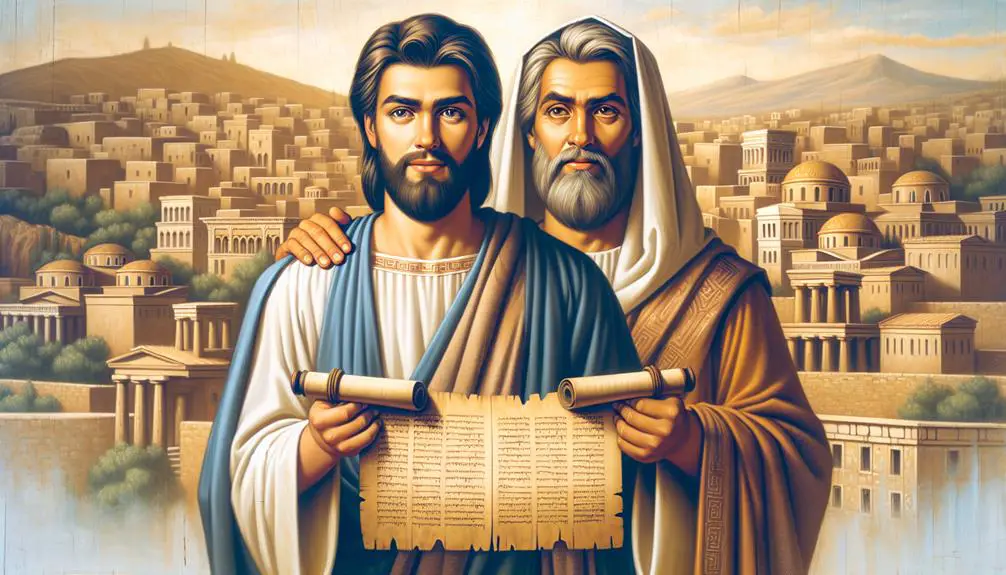Immerse yourself in the transformative journey of Sosthenes, a biblical figure whose path from adversary to ally highlights the power of faith and redemption.

Who Is Sosthenes in the Bible
You might've heard theories suggesting that the Sosthenes mentioned in the Bible was a figure of considerable transformation, but what's the truth behind this claim?
As a leader of the synagogue in Corinth, his initial encounter with Paul was anything but friendly. However, his journey from a Jewish leader to a Christian convert and collaborator with Paul is a narrative that invites curiosity.
The scant mentions in the Scriptures leave much to the imagination, yet they hint at a story of redemption and partnership that begs further exploration.
Why should you care about Sosthenes? His story might just challenge your perspectives on change and faith.
Key Takeaways
- Sosthenes was a leader in the Corinthian synagogue who embraced Christianity and collaborated with Paul.
- He underwent a significant personal transformation and became influential in spreading the Christian faith.
- Sosthenes is mentioned in Acts and 1 Corinthians, highlighting his role in the early Christian community.
- His story exemplifies resilience against persecution and the impact of spiritual transformation on his identity and legacy.
Identifying Sosthenes

Sosthenes, referenced in the New Testament of the Bible, plays a significant yet often overlooked role in early Christian history. As you delve deeper into the texts, it becomes clear that understanding Sosthenes' occupation and family connections sheds light on the broader socio-political and religious landscape of the time.
Sosthenes' occupation, according to biblical accounts, positions him as a leader within the Jewish synagogue in Corinth. This role isn't merely ceremonial; it implies a deep involvement in the community's religious, judicial, and educational affairs. As a synagogue leader, Sosthenes would have been at the forefront of interpreting Jewish law, mediating disputes, and ensuring the religious instruction of the community's youth. This position of influence suggests that Sosthenes was highly respected within his community, wielding considerable power over both spiritual and secular matters.
Exploring Sosthenes' family connections further illuminates his standing within Corinthian society. While specific details about his family are scarce in biblical texts, scholars infer that to hold such a prestigious position within the synagogue, Sosthenes must have hailed from a lineage of significant social standing. His family was likely well-established and respected, possibly with a history of service to the synagogue or the broader Jewish community. These connections would have bolstered his authority and facilitated his interactions with both Jewish and non-Jewish inhabitants of Corinth.
Understanding Sosthenes' role and familial background provides a richer context for his actions and the events that unfold in the New Testament. It reveals the complexities of religious leadership and community dynamics during a pivotal era in early Christian history.
Sosthenes' Early Life

You must understand that Sosthenes' early life, grounded in his background and origins, sets the stage for his later biblical mentions.
His upbringing, deeply embedded in the Jewish tradition, played a pivotal role in shaping the man he became, as noted in scriptural references.
This foundation is crucial for comprehending his actions and significance within the biblical narrative.
Background and Origins
Delving into the background and origins of Sosthenes reveals a figure deeply intertwined with the early Christian community and the tumultuous religious landscape of 1st-century Corinth. His presence signifies the complex interplay of cultural context, where diverse religious beliefs and practices coexisted, often leading to conflicts and confrontations.
The name etymology of Sosthenes, meaning 'safe in strength' or 'savior of his nation,' possibly reflects a status or role of significance, potentially hinting at his leadership or influential position within his community. This background sets the stage for understanding the complexities of his life, embedded within the broader narrative of early Christianity's struggle for identity and survival amidst a mosaic of cultural and religious traditions in ancient Corinth.
Biblical Mentions
In the New Testament of the Bible, two distinct references frame our understanding of Sosthenes' early life, positioning him as a central figure within the nascent Christian community of Corinth. However, Scriptural ambiguity clouds the specifics of his role and origins.
Initially, Sosthenes appears as a synagogue leader, potentially indicating a position of influence and respect within the Jewish community. His subsequent mention, alongside Paul in a letter to the Corinthians, suggests a deep involvement in the spread of Christianity. This transformation highlights Sosthenes' significant, albeit enigmatic, role in the early church.
The lack of detailed background in the Scriptures leaves much to interpretation, yet it's clear that Sosthenes played a pivotal part in bridging Jewish traditions and the emerging Christian faith.
The Incident at Corinth

Sosthenes' encounter with hostile Corinthians dramatically highlights the challenges early Christians faced in spreading their message. This incident, deeply rooted in the intricate web of Corinthian politics and mob dynamics, serves as a critical examination of the societal resistance against the nascent Christian movement. You're drawn into a scene where the intersection of religious beliefs and political power plays out with Sosthenes at its center.
Understanding the context requires diving into the political climate of Corinth, a city known for its vibrant public life and complex social hierarchies. The city's elite wielded considerable influence, often manipulating mob dynamics to serve their interests. Against this backdrop, Sosthenes, associated with the synagogue, found himself amidst a volatile situation. His role, presumably as a leader within the Jewish community, positioned him uniquely at the crossroads of religious adherence and public allegiance.
The hostility he encountered wasn't merely a spontaneous outbreak of violence but a manifestation of deeper tensions. These tensions were between traditional Jewish beliefs and the emerging Christian doctrine, further exacerbated by Corinthian society's predisposition towards public spectacles and mob justice. The incident illuminates how early Christians navigated the treacherous waters of religious expression in a society not yet ready to embrace their message fully.
Analyzing this episode, you grasp the complexities early Christians like Sosthenes faced. It wasn't just about spreading a new faith; it was about challenging entrenched social norms and navigating the perilous intersection of faith, politics, and public opinion. This confrontation in Corinth vividly encapsulates the broader struggle for acceptance and recognition that early Christians endured.
Conversion to Christianity

After facing hostility in Corinth, Sosthenes' journey took a pivotal turn toward embracing Christianity, marking a significant transformation in his beliefs and identity. This transition isn't merely a footnote in biblical history but a testament to the transformative power of faith and the profound impact of apostolic teachings. Sosthenes' conversion is emblematic of the broader shifts occurring within the religious landscape of the time, where religious persecution often served as a catalyst for deeper spiritual introspection and commitment.
Delving into the dynamics of Sosthenes' conversion, it's crucial to understand the context of religious persecution that pervaded the era. The early Christian community faced significant challenges, from social ostracization to violent oppression. For Sosthenes, a figure initially entangled in the complexities of opposing the Christian message in Corinth, the journey to conversion underscores the influence of apostolic teachings. These teachings, characterized by messages of forgiveness, redemption, and love, offered a stark contrast to the prevailing attitudes of fear and animosity.
Sosthenes' embrace of Christianity, therefore, isn't just a personal turning point but also a reflection of the broader appeal of the Christian faith amidst adversity. His conversion illustrates the power of apostolic teachings to transcend societal divisions and personal histories of opposition. Through Sosthenes' story, one can glean insights into the resilience of faith in the face of religious persecution, and the capacity for personal transformation through the acceptance of new spiritual truths. His journey from hostility to acceptance encapsulates the profound impact of Christianity on individuals and communities alike, navigating through the challenges of religious persecution with a renewed sense of purpose and identity.
Partnership With Paul

Following his conversion, Sosthenes formed a pivotal partnership with Paul, significantly influencing the spread of Christianity through collaborative efforts. This alliance wasn't merely a meeting of minds; it was a dynamic fusion of apostolic influence and leadership dynamics, setting the stage for a profound expansion of the early church. You must understand that Sosthenes didn't just play a background role; his partnership with Paul was instrumental in navigating the complex landscape of spreading the Christian faith across diverse cultures and regions.
Delving deeper into their partnership, it's clear that Sosthenes brought a unique set of skills and insights that complemented Paul's mission. His understanding of Jewish traditions, combined with his newfound Christian faith, allowed him to bridge gaps and articulate the message of Christianity in a way that resonated with both Jews and Gentiles. This was no small feat in an era marked by religious and cultural divisions.
Moreover, the leadership dynamics between Paul and Sosthenes showcased a model of mutual respect and collaboration. Rather than overshadowing one another, they leveraged their strengths to further the gospel. This synergy wasn't just beneficial; it was essential for the challenges they faced, from persecution to doctrinal disputes.
In analyzing their partnership, it's evident that Sosthenes' apostolic influence was more than just a title; it was a testament to his impact alongside Paul. Together, they navigated the early church through tumultuous times, setting a precedent for future generations of Christian leaders. Their collaboration is a reminder of the power of unified leadership in the face of adversity.
Mention in the Scriptures

While the New Testament doesn't frequently mention him, Sosthenes' presence in the scriptures is notably significant, serving as a testament to his role in the early Christian church. You'll find him primarily in two passages that shed light on his contributions and the challenges he faced. However, the details surrounding Sosthenes' role are shrouded in a certain degree of scriptural ambiguity, raising questions and prompting further exploration among scholars and theologians.
In the Book of Acts, Sosthenes appears as the chief ruler of the synagogue in Corinth, who finds himself at the center of a tumult against Paul. This episode vividly illustrates the tensions between early Christians and the Jewish community, highlighting Sosthenes' initial opposition to Paul's teachings. Interestingly, this encounter doesn't just spotlight the conflict; it also subtly hints at the complex interplay of religious and societal dynamics of the time.
The mention of Sosthenes in the opening of 1 Corinthians is equally intriguing but adds another layer of scriptural ambiguity. Here, he's referenced alongside Paul, sending greetings to the Corinthian church. This transformation from an adversary to a collaborator with Paul in spreading the Christian message underscores a profound change, either in the individual referred to or in the relationship between the early church and its wider community.
Yet, the scriptures leave room for interpretation about the exact nature of Sosthenes' role and his journey from a synagogue leader to a figure of Christian significance. This scriptural ambiguity prompts a deeper dive into the historical and theological context, enriching our understanding of his character and the nascent Christian community.
Legacy and Significance

Exploring the legacy and significance of Sosthenes offers insights into the profound impact this figure had on the early Christian church and its teachings. Delving into the narratives surrounding Sosthenes, you uncover a rich tapestry of devotion, leadership, and, ultimately, a testament to the resilience of faith under persecution.
- Sosthenes' Martyrdom: Tradition holds that Sosthenes met a martyr's end, steadfast in his faith despite the threats and violence of a society resistant to the nascent Christian movement. His martyrdom serves not just as a somber reminder of the early church's trials but as a beacon of unwavering belief in the face of adversity. This ultimate sacrifice underlines the depth of commitment expected from followers of Christ, emphasizing a legacy of courage that resonates through centuries.
- Influential Leadership: As a leader within the Corinthian church, Sosthenes' administrative and spiritual guidance was pivotal. His ability to steer the community through theological disputes and societal pressures without losing sight of the core Christian tenets showcases the critical role of leadership in nurturing and sustaining faith communities.
- Controversial Interpretations: The story of Sosthenes isn't without its complexities, giving rise to various interpretations among scholars and theologians. These debates enrich our understanding of early Christian dynamics, illustrating how figures like Sosthenes influenced doctrinal development and interpretive frameworks within the church.
Sosthenes' legacy, marked by his martyrdom and leadership, alongside the controversial interpretations surrounding his life, highlights the multifaceted impact of his contributions to Christianity. Through his story, you grasp the enduring significance of faith, leadership, and the complexities of early church history.
Frequently Asked Questions
How Has the Figure of Sosthenes Influenced Modern Christian Practices or Beliefs?
You might wonder how a figure's legacy influences modern practices or beliefs.
Sosthenes' leadership and spiritual legacy have subtly shaped Christian thought and practice. His example of resilience and dedication in early Christian communities underscores the value of steadfast faith and unity in adversity.
This legacy encourages today's believers to uphold similar values, fostering a sense of continuity and inspiration within the Christian faith, deeply embedding his influence in contemporary spiritual life.
Are There Any Existing Archaeological Findings or Historical Artifacts Directly Linked to Sosthenes?
You're looking into whether archaeological findings or historical artifacts are linked to Sosthenes' lineage. Currently, there's no direct evidence connecting him to any specific discoveries.
This gap presents interpretation challenges, as without material culture or inscriptions, it's tough to trace his impact or existence concretely. Analysts rely heavily on textual analysis and historical context, striving to piece together his role and significance from sparse and indirect references.
Have There Been Any Significant Literary Works or Artworks Throughout History That Prominently Feature Sosthenes?
Imagine diving into a vast sea of history and literature, where Sosthenes emerges as a pearl of ancient symbolism. Unfortunately, there's a scarcity of significant literary works or artworks that prominently feature Sosthenes, making this pearl quite rare.
Despite this, his symbolism and cultural representations trickle through history's canvas, offering glimpses into the past. This scarcity challenges scholars and enthusiasts to piece together Sosthenes' impact from the fragments available.
How Do Different Christian Denominations Interpret the Role and Contributions of Sosthenes Within the Early Church?
You're diving into how various Christian denominations perceive Sosthenes' leadership and contributions in the early church. Each denomination brings its own lens, analyzing his role with distinct theological underpinnings.
Some view him as a pivotal figure in church formation, emphasizing his leadership qualities and dedication.
Others might interpret his contributions more subtly, focusing on the collaborative aspects of his work.
This diversity enriches the understanding of his impact across the Christian spectrum.
What Are the Most Common Misconceptions or Lesser-Known Facts About Sosthenes Outside of the Biblical Narrative?
You might find it surprising, but there's more to Sosthenes than meets the eye. Beyond his biblical persona, common misconceptions often overshadow his actual occupation and lineage.
Contrary to popular belief, Sosthenes' role wasn't limited to religious duties; his professional life and family background offer a richer understanding of his identity. Analyzing these facets sheds light on the complexities of his character, moving beyond simplified biblical narratives to appreciate his full historical significance.
Conclusion
In the grand tapestry of biblical narratives, Sosthenes emerges as a vibrant thread, weaving through tumult and transformation. You've traced his journey from an antagonist in Corinth to a co-author with Paul, illustrating the profound impact of conversion.
His story, though briefly mentioned in the scriptures, leaves a lasting impression, underscoring the power of faith and partnership in spreading the Gospel. Sosthenes' legacy, thus, serves as a testament to the transformative grace that threads through the fabric of Christian history.



Sign up